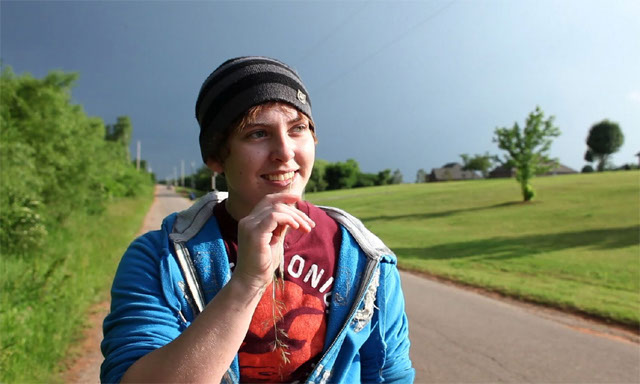
Film: Bully
Country: USA
Year of Release: 2011
Director: Leigh Hirsch
Screenwriters: Leigh Hirsch, Cynthia Lowe
Starring: Ja’Meya Jackson, Kelby Johnson, Londa Johnson, Bob Johnson, Alex Libby, Jackie Libby
♥♥♥♥
The documentary Bully, which opens at cinemas next Friday, provides an intimate account of bullying in the American school system. Book-ended by interviews with the father of Tyler Long who hung himself in his bedroom cupboard after years of torment, the film tells the story of five American families whose lives have been pretty much destroyed by bullying at school and the general lack of response from educational authorities and society at large.
We meet the friendless young Alex Libby, whose buck teeth and permanent pout have made him the objective of universal derision at school. The film also introduces us to the brave and inspiring Kelby Johnson, whose decision to live openly as a gay teenage girl has made her family the pariah of the community from which she refuses to run away. We also get to know some of the parents, teachers and other adults who exist on the periphery of a world defined by psychological violation.
Among these tenderly rendered narratives, the story I found most heartbreaking was that of Ja’Meya Jackson, who, having had enough of the constant bullying on the school bus, took her mother’s gun to school one morning, brandishing it in response to the relentless threats. Instead of her actions being seen as a desperate attempt to stand up for herself, this beautiful young person, whose only real guilt is her innocence, sees the possibilities of her life being shut down by the prospect of growing up in prison.
Bully was directed by Leigh Hirsch, previously responsible for one of my very favourite films – documentary or otherwise – Amandla – A Revolution in Four Part Harmony (2002), which looked at the role of music in the South African revolution. At the time, another writer suggested that the film was so good and Hirsh’s vision so clear because, being an American, he had the luxury of distance. I’ve always wondered about that comment, and watching Bully, Hirsh provides a similar kind of distance documenting events in his own country. But it’s a very strange kind of distance, for like Amandla, Bully uses the documentary process in an extraordinarily intimate way. The camera is both there and not there, an approach whose careful restraint reduced me to tears in both films, tears that were far more closely related to the reality being documented than any attempt by the filmmaker to manipulate my emotions.
Bully has the same title as Larry Clark’s 2001 fiction feature film. Regardless of whether the Clark reference is intentional or not, it’s entirely relevant. One of the things that Clark’s film do is about bringing marginalised teenagers to the centre, which he does with an honesty that is at once salacious and honest, and an approach that, while highly stylised, often has the resonance of documentaries. Thinking of Clark’s film, some critics of Hirsh’s Bully might complain that it isn’t hard-hitting enough because it focuses on the bullied rather than the bullies themselves, and is more about the impact of psychological bullying than physical assault.
But those who are looking for more explicit forms of violence are falling into the same trap as the headmasters, school boards and even some of the parents, who fail to recognise the depth and breadth of the problem. While physical violence is part of the texture of threat documented by the film, it is the psychological abuse that is shown to be the most damaging. The daily threat of being knifed, for example, might be more harrowing than a single experience of being physically attacked.
There is much that is not included in Bully. In his careful approach to his subject matter Hirsh doesn’t provide a sociological deconstruction. There are no interviews with experts, no search for causes or effects, just searing portraiture of the broken young lives of five teenagers whose only crime is being different to their peers.
The only criticism I really have of the film – and in all honesty, it’s garnered from another review and one which I probably wouldn’t have picked up on myself – is the fact that all of Leigh’s subjects live in deeply conservative areas of the American heartland. In the process it creates a somewhat stereotypical view of working-class America – albeit one that we have seen so many times before that it’s hard to discount – while leaving the more liberal areas of the United States unexplored.
But while, I think this is a very valid point, it doesn’t make the film any less riveting or emotionally engaging. Although this is only his second feature-length documentary, I think it’s safe to say that Hirsh is a truly gifted director. Both Bully and Amandla – which feels almost as fresh in my mind, a remarkable fact considering that I last watched it nine years ago – are as engaging and riveting as fiction features, although they never pretend to be anything except what they are.
While documentaries are finally edging towards the mainstream – thanks largely to their popularity on television – they’re often poorly made, a fact that’s usually easy to forgive in exchange for fascinating content. Hirsh dazzles on both counts. Bully is a powerful documentary made all the more impressive by the fact that it is also an exquisitely rendered piece of cinema.
© PETER MACHEN 2017